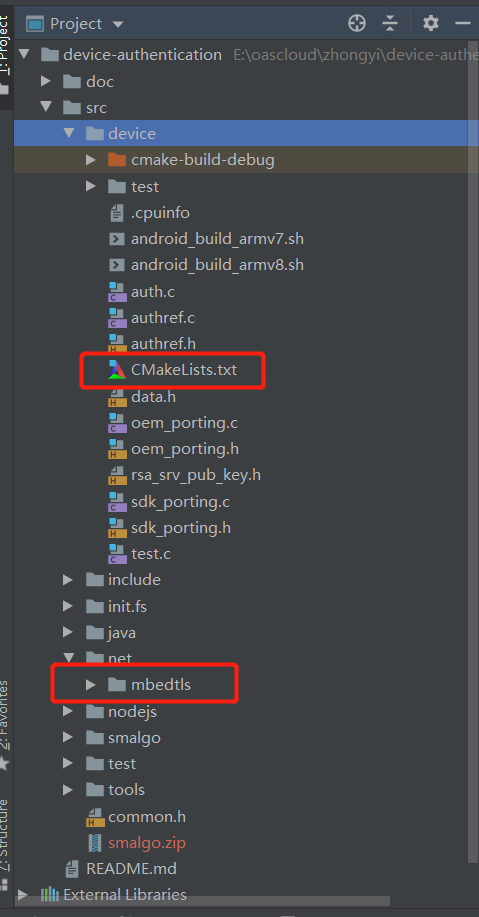In recent projects, AES algorithm needs to be implemented by C language. Here I implement it by Mbedtls library.
1. Download Mbedtls
First, we put the Mbedtls code into the project, and the related transmission gates are as follows:
Official download address of Mbedtls
The official website is slow download abroad, so the Mbedtls code used in this article is also attached. The portal is as follows:
Mbedtls encryption and decryption tool code
2. Import Mbedtls header file
Here, we introduce the header file of Mbedtls into CMakeLists.txt in the project. The code is as follows:
# for debug
# add_compile_options(-g)
project("device-authentication")
cmake_minimum_required(VERSION 3.5)
INCLUDE_DIRECTORIES(
../include/
../../src/net/mbedtls/include
../../src/smalgo/sms4/include
)
SET(my_src_crypto
../../src/net/mbedtls/library/aes.c
../../src/net/mbedtls/library/aesni.c
../../src/net/mbedtls/library/base64.c
../../src/net/mbedtls/library/rsa.c
../../src/net/mbedtls/library/rsa_internal.c
../../src/net/mbedtls/library/entropy.c
../../src/net/mbedtls/library/entropy_poll.c
../../src/net/mbedtls/library/bignum.c
../../src/net/mbedtls/library/sha1.c
../../src/net/mbedtls/library/sha256.c
../../src/net/mbedtls/library/sha512.c
../../src/net/mbedtls/library/md.c
../../src/net/mbedtls/library/md5.c
../../src/net/mbedtls/library/md_wrap.c
../../src/net/mbedtls/library/ripemd160.c
../../src/net/mbedtls/library/platform_util.c
../../src/net/mbedtls/library/oid.c
../../src/net/mbedtls/library/timing.c
../../src/net/mbedtls/library/net_sockets.c
../../src/smalgo/sms4/cbc128.c
../../src/smalgo/sms4/sms4_cbc.c
../../src/smalgo/sms4/sms4_common.c
../../src/smalgo/sms4/sms4_enc.c
../../src/smalgo/sms4/sms4_setkey.c
)
SET(my_src_crypto_dbg
../../src/net/mbedtls/library/ctr_drbg.c
)
SET(SRC_LIST_ENCRYPT_BIN
oem_porting.c
sdk_porting.c
authref.c
test.c
${my_src_crypto}
${my_src_crypto_dbg}
)
SET(SRC_LIST_DECRYPT_LIB
oem_porting.c
sdk_porting.c
authref.c
auth.c
${my_src_crypto}
${my_src_crypto_dbg}
)
#SET(SRC_LIST_AUTH_DEV
# oem_porting.c
# sdk_porting.c
# authref.c
# ${my_src_crypto}
# ${my_src_crypto_dbg}
#)
add_definitions(-fPIC)
#ADD_LIBRARY(authd STATIC ${SRC_LIST_AUTH_DEV})
ADD_LIBRARY(authoal STATIC ${SRC_LIST_DECRYPT_LIB})
ADD_EXECUTABLE(eaidkAuth ${SRC_LIST_ENCRYPT_BIN})The project structure is as follows:

After the introduction, we can start to write AES code.
3. AES coding
The code of authref.h header file is as follows:
#ifndef __AUTHREF_H__
#define __AUTHREF_H__
#include <assert.h>
#include <stdio.h>
#include <string.h>
#include <stdlib.h>
#undef DEBUG
#define AES_KEY_SIZE 48
#define AES_IV_LEN 16
#ifdef __cplusplus
extern "C" {
#endif
// aes encryption
// aes_key -- Maximum 48 bytes
// iv -- up to 16 bytes
// plaintext -- text to be encrypted
// ciphertext -- encrypted text
// len -- len should be 16*N bytes
// return – 0 for ok, else for error
int aes_cbc_encryp(uint8_t *aes_key, uint8_t *iv, uint8_t *plaintext, uint8_t *ciphertext, uint32_t len);
// aes decryption
// aes_key -- Maximum 48 bytes
// iv -- up to 16 bytes
// ciphertext -- text to be decrypted
// plaintext -- decrypt good text
// len -- len should be 16*N bytes
// return – 0 for ok, else for error
int aes_cbc_decryp(uint8_t *aes_key, uint8_t *iv, uint8_t *ciphertext, uint8_t *plaintext, uint32_t len);
#ifdef __cplusplus
}
#endif
#endif //__AUTHREF_H__
The authref.c code is as follows:
#include "authref.h"
#include "mbedtls/entropy.h"
#include "mbedtls/ctr_drbg.h"
#include "mbedtls/aes.h"
//len should be 16*N bytes
int aes_cbc_encryp(uint8_t *aes_key, uint8_t *iv, uint8_t *plaintext, uint8_t *ciphertext, uint32_t len) {
int i;
int blk = (len + 15) >> 4;
mbedtls_aes_context aes_ctx;
mbedtls_aes_init(&aes_ctx);
//setkey_dec
mbedtls_aes_setkey_enc(&aes_ctx, aes_key, 256);
for (i = 0; i < blk; ++i) {
mbedtls_aes_crypt_cbc(&aes_ctx, MBEDTLS_AES_ENCRYPT, 16, iv, plaintext + (i * 16), ciphertext + (i * 16));
}
mbedtls_aes_free(&aes_ctx);
return 0; //OK
}
//len should be 16*N bytes
int aes_cbc_decryp(uint8_t *aes_key, uint8_t *iv, uint8_t *ciphertext, uint8_t *plaintext, uint32_t len) {
int i;
int blk = (len + 15) >> 4;
mbedtls_aes_context aes_ctx;
mbedtls_aes_init(&aes_ctx);
//setkey_dec
mbedtls_aes_setkey_dec(&aes_ctx, aes_key, 256);
for (i = 0; i < blk; ++i) {
mbedtls_aes_crypt_cbc(&aes_ctx, MBEDTLS_AES_DECRYPT, 16, iv, ciphertext + (i * 16), plaintext + (i * 16));
}
mbedtls_aes_free(&aes_ctx);
return 0; //OK
}AES encryption / decryption pseudo code is as follows:
ret = aes_cbc_encryp(&key, &iv, uuid, (uint8_t*)&data, 64); ret = aes_cbc_decryp(&key, &iv, uuid, (uint8_t*)&data, 64);
This is the end of the AES encryption and decryption introduction.

